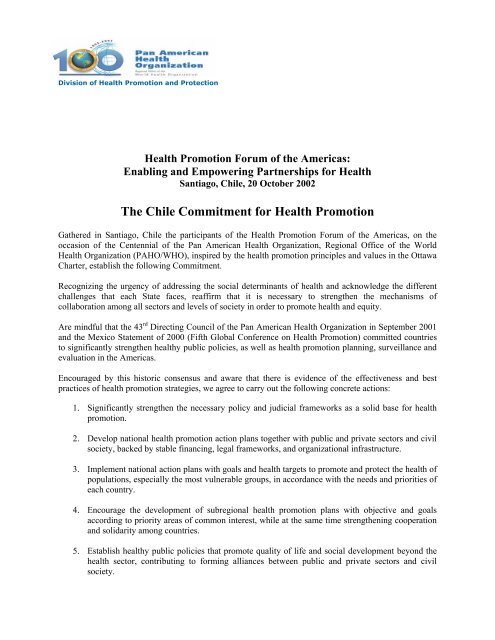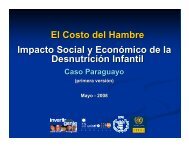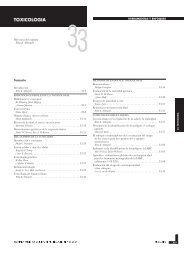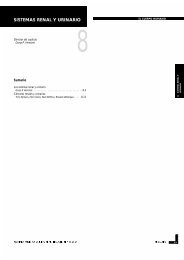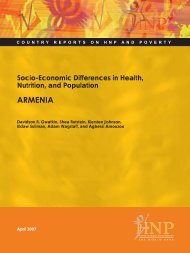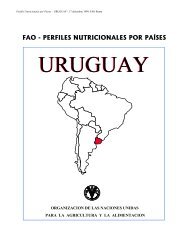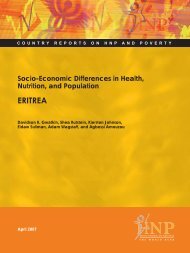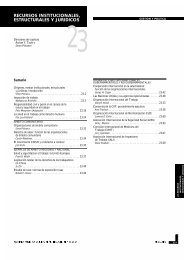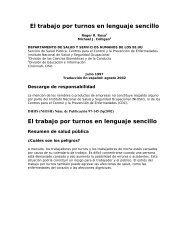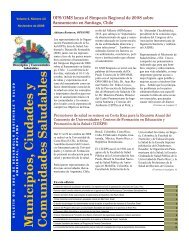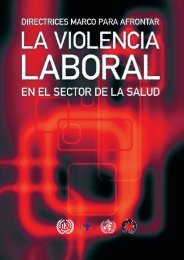The Chile Commitment for Health Promotion - BVSDE - PAHO/WHO
The Chile Commitment for Health Promotion - BVSDE - PAHO/WHO
The Chile Commitment for Health Promotion - BVSDE - PAHO/WHO
Create successful ePaper yourself
Turn your PDF publications into a flip-book with our unique Google optimized e-Paper software.
Division of <strong>Health</strong> <strong>Promotion</strong> and Protection<strong>Health</strong> <strong>Promotion</strong> Forum of the Americas:Enabling and Empowering Partnerships <strong>for</strong> <strong>Health</strong>Santiago, <strong>Chile</strong>, 20 October 2002<strong>The</strong> <strong>Chile</strong> <strong>Commitment</strong> <strong>for</strong> <strong>Health</strong> <strong>Promotion</strong>Gathered in Santiago, <strong>Chile</strong> the participants of the <strong>Health</strong> <strong>Promotion</strong> Forum of the Americas, on theoccasion of the Centennial of the Pan American <strong>Health</strong> Organization, Regional Office of the World<strong>Health</strong> Organization (<strong>PAHO</strong>/<strong>WHO</strong>), inspired by the health promotion principles and values in the OttawaCharter, establish the following <strong>Commitment</strong>.Recognizing the urgency of addressing the social determinants of health and acknowledge the differentchallenges that each State faces, reaffirm that it is necessary to strengthen the mechanisms ofcollaboration among all sectors and levels of society in order to promote health and equity.Are mindful that the 43 rd Directing Council of the Pan American <strong>Health</strong> Organization in September 2001and the Mexico Statement of 2000 (Fifth Global Conference on <strong>Health</strong> <strong>Promotion</strong>) committed countriesto significantly strengthen healthy public policies, as well as health promotion planning, surveillance andevaluation in the Americas.Encouraged by this historic consensus and aware that there is evidence of the effectiveness and bestpractices of health promotion strategies, we agree to carry out the following concrete actions:1. Significantly strengthen the necessary policy and judicial frameworks as a solid base <strong>for</strong> healthpromotion.2. Develop national health promotion action plans together with public and private sectors and civilsociety, backed by stable financing, legal frameworks, and organizational infrastructure.3. Implement national action plans with goals and health targets to promote and protect the health ofpopulations, especially the most vulnerable groups, in accordance with the needs and priorities ofeach country.4. Encourage the development of subregional health promotion plans with objective and goalsaccording to priority areas of common interest, while at the same time strengthening cooperationand solidarity among countries.5. Establish healthy public policies that promote quality of life and social development beyond thehealth sector, contributing to <strong>for</strong>ming alliances between public and private sectors and civilsociety.
6. Incorporate health promotion as a central component in the health sector re<strong>for</strong>m process and as abasic element in the reorientation of health systems and services, improving access to servicesand essential drugs.7. Rein<strong>for</strong>ce the relationship between national policy and local actions. As part of thedecentralization process of health promotion, local authorities are assuming leadership to positionhealth on the political agenda, rein<strong>for</strong>cing health promotion in municipalities, communities,schools and work places.8. Implement local action plans with goals and health targets or objectives, strengthening healthymunicipalities and communities, a healthy diet and physical activity, the prevention of violenceand accidents, as well as the promotion and protection of human rights.9. Strengthen municipal management capacities to establish intersectoral committees, developaction plans and implement long-term and short-term health promotion strategies with theparticipation of civil society.10. We dedicate ourselves to improving the health and quality of life of the population of theAmericas, taking into account the commitments in the UN Millennium Goals (especially,reducing maternal and infant mortality), as well as the <strong>PAHO</strong>/<strong>WHO</strong> Strategic Plan 2003-07(especially promoting healthy lifestyles and social spaces, and growth and development).11. Rein<strong>for</strong>ce or develop surveillance, monitoring and evaluation of the different health promotionplans, processes and strategies at the subregional, national and local levels.Support MechanismsWe recognize that in order to implement health promotion political frameworks, strategies and actionplans, the following support mechanisms must be in place:• A critical mass of professionals and community leaders trained and constantly updated in the area ofhealth promotion. Although there is the need to evaluate and document experiences in the Region,the health promotion knowledge base and evidence is increasing at such an accelerated rate that it isessential that researchers, academic centers, professionals and government maintain continuouscommunication and collaboration.• Partnerships between public and private sectors and NGOs to foster and support the implementationof healthy public policies, including actions to protect the environment, and national health promotionplans (including the monitoring and evaluation of policies, action plans and goals).• A scientific evidence base <strong>for</strong> of the establishment of health promotion policies at the regional andnational level. <strong>The</strong> Member States should strengthen the evaluation of health promotion strategies, aswell as strengthen surveillance systems and monitoring mechanisms in order to support politicaldecisions with data and provide scientific evidence of achievements and progress.In support of these actions, <strong>PAHO</strong> will strengthen leadership and technical cooperation in healthpromotion, facilitating the collaboration among countries and the mobilization of necessary resources. It
will also assist in the monitoring and evaluation of the progress in fulfilling this <strong>Commitment</strong> and willin<strong>for</strong>m the Member States every three years.<strong>PAHO</strong> will also offer opportunities <strong>for</strong> disseminating and sharing knowledge and experiences gained inthe process of reaching the agreements adopted in the <strong>Chile</strong> <strong>Commitment</strong> through publications, the Webpage, subregional meetings, and periodic conferences.Signed on 24 October 2002 in Santiago, <strong>Chile</strong>._________________________Dr. Osvaldo ArtazaMinister of <strong>Health</strong> of <strong>Chile</strong>__________________________Dr. María del Rocío SáenzMinister of <strong>Health</strong> of Costa Rica___________________Dr. María T. CerqueiraDirectorDivision of <strong>Health</strong> <strong>Promotion</strong> and Protection, <strong>PAHO</strong>


